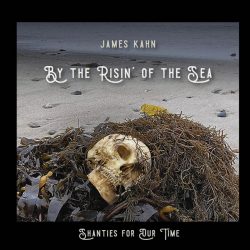Southern Californian Renaissance man James Kahn’s album of sea shanties takes on global existential crises as its theme.
 Sea shanties have been in vogue off and on over the years, even in the days before TikTok, where apparently they’re now a trend of their own. A semi-pro landlocked folk group charges $2000 a gig. Shanties have even popped up in the video game Baldur’s Gate 3 in the form of a lore item called Shanties for the Bitch Queen, which became a project for songwriter Freya Catherine. According to a folklore blog at the Library of Congress, sea shanties first began on trans-Atlantic non-naval working ships in the era before steamships: “…some people use the phrase ‘sea shanty’ to mean any song sung by sailors, but the word had a more specific meaning in nautical culture. Properly speaking, shanties are work songs sung aboard ships and boats. The word shanty, referring to this kind of song, turns up in the 1850s in the context of shipboard singing. No one initially called them ‘SEA shanties,’ which would have been unnecessary: only seagoing work songs, it seems, were called ‘shanties’ back then.”
Sea shanties have been in vogue off and on over the years, even in the days before TikTok, where apparently they’re now a trend of their own. A semi-pro landlocked folk group charges $2000 a gig. Shanties have even popped up in the video game Baldur’s Gate 3 in the form of a lore item called Shanties for the Bitch Queen, which became a project for songwriter Freya Catherine. According to a folklore blog at the Library of Congress, sea shanties first began on trans-Atlantic non-naval working ships in the era before steamships: “…some people use the phrase ‘sea shanty’ to mean any song sung by sailors, but the word had a more specific meaning in nautical culture. Properly speaking, shanties are work songs sung aboard ships and boats. The word shanty, referring to this kind of song, turns up in the 1850s in the context of shipboard singing. No one initially called them ‘SEA shanties,’ which would have been unnecessary: only seagoing work songs, it seems, were called ‘shanties’ back then.”
James Kahn, the physician turned novelist/TV and film writer/TV producer turned songwriter, chose to use the genre for an album of songs about COVID and apocalyptic environmental warnings. He is based in Santa Barbara, so naturally, the ocean looms large in his day-to-day life and acts as the thematic glue on ‘By The Risin’ Of The Sea.’ Changes in the oceans are an unresolved problem for environmental prophets of doom. This week the World Meteorological Organization announced that global oceans reached their hottest and most acidic levels ever recorded in 2021. Kahn was also inspired by his colleague David West, who suggested the album.
Kahn’s songs are inarguably true to the traditional form of shanties, mostly a capella with sparse musical accompaniment on accordion (played by Brian Mann), acoustic guitar, pennywhistle, hammer dulcimer, and, eerily, bones used for percussion by Sharmon Turmondt. There are guest appearances by The Punch Brothers’ Gabe Witcher and Toad The Wet Sprocket’s Glen Phillips. The four- and five-part vocal harmonies, particularly on the title track, are impressive, as is its award-winning video.
Folk songs about man versus nature are nothing new, but the modern subject matter here tends to be didactic. The metaphor of all humans on earth being in the same boat, et cetera, is ever-present. The mellowness of the vocals and music doesn’t do much to reduce the negative impact of the message. The planet is facing environmental doom due to the rising seas and enough trash floating in the ocean to fool sailors into thinking that a lush island was up ahead (‘Island of Dreams’). Much of that five-mile swath of litter in the Pacific Ocean is the direct result of a culture of consumerism that has been pushed onto the rest of the world in ever-widening concentric circles. On the lovely ‘O The Ocean Rolls’ Cuban refugees desperately try to escape on a flimsy vessel, a perilous journey made more dangerous by rougher seas but one Cubans have risked long before eco-catastrophe.
The energetic ‘In The Covid Times’ could be a proper foot-stomping singalong, but considering how bawdy shanties could be, the radio-edit censoring of vulgar language seems unnecessary. ‘2020 Ship of Fools’ is another COVID song about being away for “this bloody long year.” A COVID outbreak on a cruise ship is rewritten as a tongue-in-cheek pirate tale in ‘Bucket O’Bones.’ ‘No More A-Whalin’’ is about the over-hunting of whales and ‘Sundown’ provides a further warning about the loss of species. Khan says, “Climate change is the biggest existential crisis facing us, resulting in drought, fires, floods, species die-offs, crop failures, and of course, rising seas. Maybe we can still mitigate some of the ruin.”
Like all good science fiction writers, he can get his point across subtly and at other times scare the hell out of his audience, and he does both here. Either way, the listener longs for less eventful times than those described here – and smoother sailing.


